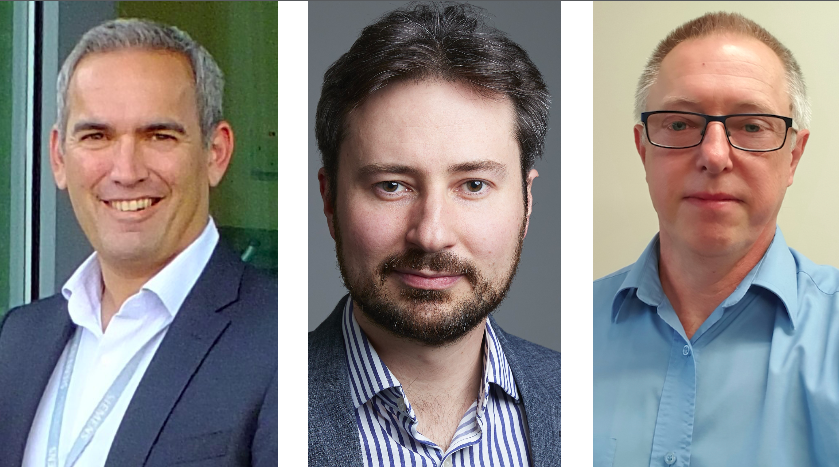![SME Innovation collaboration[1]](https://cigre.org.uk/web-cont1001/uploads/both-dates-SME-Innovation-collaboration1.png)
Collaboration: an overused buzz word or the key to revolution in today’s rapidly evolving world of power systems? What does collaboration really look like when it comes to innovating in this sector? And how can SMEs with nascent ideas make an impact through allying with established companies?
CIGRE UK in conjunction with the GLA-led Better Futures programme*, is hosting two sessions to bring together SMEs and established players in the UK Energy Supply industry. Each session provides an opportunity to examine what collaboration really looks like when it comes to innovation in the UK Energy Supply industry. They hope to identify the biggest challenges and begin to champion innovation within the SME community as a crucial part of the Energy Transition.
This first event sees two innovative young companies – Hydrologiq and Powervault in discussion with a panel of representatives from Siemens, EPEX, Reactive Technologies and Elimpus. The second event which takes place on the 20th January 2021 will see the same panel in discussion with Oak Network and Solveteq.
* In a bid to make London Europe’s leading Greentech hub, Better Futures is an ERDF part-funded project to support the growth and success of low-carbon and cleantech businesses across London. A partnership led by the GLA, it includes Imperial College, Sustainable Ventures, Old Oak Park Royal Development Corporation and West London Business.
Agenda – 20th January
15:00 – 15:05: Introduction, Dr Biljana Stojkovska
15:05 – 15:21: SME and Panel introduction, Dr, Biljana Stojkovska (Moderator)
15:21 – 15:26: Solveteq – outline of Topic (Sustainability of the supply chain for the energy storage segment) & Questions (The level of supply chain adaptation required, by big and small players, when using batteries as a core element of their business, i.e. how they will change their business models and supply chain in case they need to start recycling batteries)
15:26 – 15:36: Panel Discussion
15:36 – 15:51: Oak Network – outline of Topic (Access to energy data and data management) & Question (What is the importance of the data access and data management in building a sustainable energy strategy?)
15:41 – 15:51: Panel discussion
15:51 – 16:00: Summary and closing remarks
To Register for this event
Panel

Mark Tiernan
Bio: GB&I Head of Substations and Grid Stability for Siemens Energy – Started as a Student Apprentice, with 30 years’ experience in the High Voltage electricity transmission and distribution industry. Chartered Engineer and Durham MBA Alumni. Technical background in control and Protection. Managed complex EPC projects across the world (UK, Malaysia, Saudi Arabia, Turkey, and Iran) from traditional substations, Grid stability, Offshore windfarms and HVDC interconnectors. Part of Siemens Energy GB&I Energy Transition Senior management team focussing on Clean technologies, Network stability, and Energy Storage.
Why is innovation collaboration important: As part of the critical Energy Transition, it requires agility and collaboration within the marketplace across the academic/corporate/SME sectors in experimentation and delivery to accelerate our journey to Net Zero and beyond. None of us can do this alone!
Chris Kimmet
Bio: Chris Kimmett is Director Power Grids at Reactive Technologies and leads the energy technology company’s solutions for Grid operators. Aside from his role with CIGRE he is also Chairman of Flexassure UK (which sets common standards for demand side response aggregators). Chris is passionate about bringing new technology to market that can help digitalise and decarbonise the energy industry globally. Prior to joining Reactive, Chris worked for Open Energi, enabling the ‘long tail’ of demand side assets and behind the meter storage to participate in National Grid’s Frequency Response markets and before that worked in Accenture’s sustainability practice, transforming blue chip organisations’ approach to Energy, Carbon, Water, Waste and Health & Safety.
Why is innovation collaboration important: Innovation coming from a single great mind is a myth – real innovation comes from diversity of thought, recombination of best practices and efficient allocation of capital to ideas and execution.
Phil Moore
Bio: Phil Moore trained with GEC ALSTOM, Stafford and worked as a Relay Design Engineer before moving into academia. Over a period of 20 years he worked at several Universities, specialising in Electrical Power Engineering. In 2007, whilst Professor of Electrical Plant and Diagnostics at Strathclyde University, he co-founded Elimpus which is a condition monitoring solutions provider to the electricity supply industry. He has been the full-time Technical Director of Elimpus since 2009.
Why is innovation collaboration important: Relatively few innovations come about by groups working in isolation, rather, successful innovations require team work from the entire supply chain from manufacturers through to solution providers through to the end user.
Moderator
Biljana Stojkovska
 Bio: National Grid ESO Innovation Technical Manager Dr. Biljana Stojkovska is an esteemed figure in the energy revolution with one of the most transformational projects that the energy industry has seen. The project is called Power Potential and Dr. Stojkovska is leading a multidisciplinary team that is pioneering a whole system approach to connect additional renewable energy in a new regional reactive power market trial. This trial is expected to improve interaction between National Grid’s Electricity System Operator, Regional Electricity Distributors and Renewable Energy Generators connected to the distribution system to create a cost- effective new revenue stream for embedded generators and give greater robustness to the power system.
Bio: National Grid ESO Innovation Technical Manager Dr. Biljana Stojkovska is an esteemed figure in the energy revolution with one of the most transformational projects that the energy industry has seen. The project is called Power Potential and Dr. Stojkovska is leading a multidisciplinary team that is pioneering a whole system approach to connect additional renewable energy in a new regional reactive power market trial. This trial is expected to improve interaction between National Grid’s Electricity System Operator, Regional Electricity Distributors and Renewable Energy Generators connected to the distribution system to create a cost- effective new revenue stream for embedded generators and give greater robustness to the power system.
She is also Technical Manager for Offshore Coordination leading a team who is working on expansion of the offshore network. The overall aim is to achieve the most economic and efficient network solution on offshore coordination with emphasis on reducing the environmental impact on the onshore landing points to meet government green future objectives for offshore wind in 2030 and 2050.
Biljana is a Charted engineer, Fellow of the IET and Founder and Chair of the CIGRE UK Women’s Network. She is a skilled communicator, experienced in presenting at international conferences, collaborating across multiple sectors and government regulatory bodies.
SMEs
 Solveteq offers a cheap and safe technology for recycling lead-acid batteries (LABs), whilst significantly reducing the environmental impact of lead. Solveteq’s technology will enable recycling companies to significantly reduce their expenditure on energy and environmental control. The green process has the potential to transform the battery recycling industry and establish next-generation practices.
Solveteq offers a cheap and safe technology for recycling lead-acid batteries (LABs), whilst significantly reducing the environmental impact of lead. Solveteq’s technology will enable recycling companies to significantly reduce their expenditure on energy and environmental control. The green process has the potential to transform the battery recycling industry and establish next-generation practices.
Link to info video: https://www.youtube.com/watch?v=y9w9ioEpVgw
 Oak Network provides independent access to energy data to help energy users understand and improve their consumptions. Their approach enables business to optimise their energy consumption by 15% and more whilst reducing their carbon footprint drastically
Oak Network provides independent access to energy data to help energy users understand and improve their consumptions. Their approach enables business to optimise their energy consumption by 15% and more whilst reducing their carbon footprint drastically
Website: https://oakdata.net/
 Hydrogen powered off-grid electricity to festivals/event, film production and construction sectors. Replacing diesel generators with a modular hydrogen fuel cell powered system. They aim to provide the generators as a service.
Hydrogen powered off-grid electricity to festivals/event, film production and construction sectors. Replacing diesel generators with a modular hydrogen fuel cell powered system. They aim to provide the generators as a service.
Website: https://hydrologiq.com/
 Powervault designs and manufactures smart energy storage systems for the home, which store free solar energy and cheap electricity from the grid to reduce household energy bills and increase energy efficiency. It also focuses on changing consumers’ energy consumption behaviours by encouraging energy efficiency and the adoption of renewable energy technologies.
Powervault designs and manufactures smart energy storage systems for the home, which store free solar energy and cheap electricity from the grid to reduce household energy bills and increase energy efficiency. It also focuses on changing consumers’ energy consumption behaviours by encouraging energy efficiency and the adoption of renewable energy technologies.
Website: https://www.powervault.co.uk/

